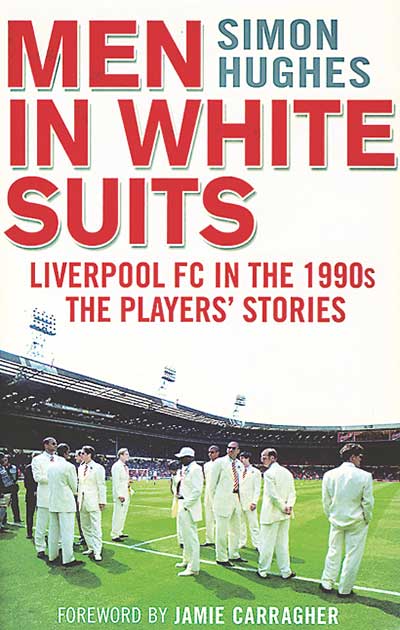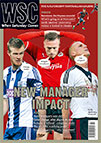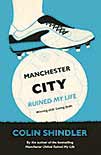Search: ' Global United'
Stories
 Badge of the week ~ Al Hussein Sports Club, Jordan
Badge of the week ~ Al Hussein Sports Club, Jordan
Al Hussein Sports Club came into existence after their founder, a share fisherman, was hypnotised by a storm petrel. Khalid Hussan, later to become first club president, was having a cigarette on deck in the dead of night when the diminutive bird alighted on the boat railing and cocked a gleaming eye his way. Lost in his own reverie – in his own words he was wondering at the time how to dry plates while his wife washed up without looking inadequate – Hussan paid no heed to the bird at first, but then realised he had been staring into its beady eye for several minutes.
 Liverpool FC in the 1990s – the players’ stories
Liverpool FC in the 1990s – the players’ stories
by Simon Hughes
Bantam, £18.99
Reviewed by Rob Hughes
From WSC 340 June 2015
Among the insightful voices in Simon Hughes’s book, John Scales cuts to the issue most succinctly. “Money changed the game and it’s no surprise that a club with socialist principles was the first to fall by the wayside,” he says, referring to the ethos promoted by Bill Shankly, the manager who revolutionised the club in the 1960s. The 1990s was a time of rapid change in English football, where big clubs became global businesses, revenue flooded in from international TV deals and wages ballooned. This increased market competition, however, was just one of the many factors in Liverpool’s decline.
Much like its predecessor, 2013’s Red Machine: Liverpool FC In The 1980s, Hughes’s tome tells the story through interviews with a number of former players and managers. Alongside Scales we have Jan Molby, Jamie Redknapp, Jason McAteer, Graeme Souness and Roy Evans, among others, all of whom look back on their Liverpool tenure with a variable mixture of pride, regret and, occasionally, a little bitterness.
The title of Men In White Suits recalls the team’s ill-advised Wembley walkabout before the 1996 FA Cup final, decked out in flashy Armani gear, and provides the ready metaphor for Liverpool’s failings under Evans. Here was a team capable of the most flamboyant football, but who seemed to lack the required focus and discipline to win trophies: all silk and no steel.
What quickly becomes clear, sifting through the various testimony, is that Liverpool were undone by their own past success. Coaches and management still relied on the same procedures, diets and training methods (even continuing to use the rotting wooden boards at the Melwood training ground for shooting practice) that had sustained the club throughout the 1970s and 1980s. Other clubs, meanwhile, had moved with the times and had adopted a more sophisticated ideology. And when it came to the transfer market (shipping out Peter Beardsley and others before their prime; investing in the likes of Julian Dicks, Paul Stewart and Nigel Clough) it all got pretty embarrassing.
The conclusions of those involved are often fascinating. Both Redknapp and Molby agree that Souness’s management style was unnecessarily aggressive, intent on changing too much too soon. Souness himself, with engaging candour, concedes that he blew his chance and that it was the right job at the wrong time. Evans, too, is big enough to admit some shortcomings, not least the gung-ho attitude to attacking football when grinding out results was often the better option. Although he bristles at the suggestion that he was too much of a nice guy to rule effectively.
The potential to reclaim old glories was certainly there, assert McAteer and Scales, but they attribute Liverpool’s inconsistency to the lack of experienced, “streetwise” leaders on the pitch. And, for fans such as myself, it makes me wince to read how Souness turned down the chance to sign both Peter Schmeichel and Eric Cantona before they were anywhere near Manchester United’s radar. Inconstancy, woeful transfer dealings, lack of leadership and an inability to compete with the top clubs around them. Thank God those days are over.
 England face Costa Rica at the 2014 World Cup but they won’t be the first of the home nations to do so and would be wise to heed their neighbour’s traumatic experience, writes Archie MacGregor
England face Costa Rica at the 2014 World Cup but they won’t be the first of the home nations to do so and would be wise to heed their neighbour’s traumatic experience, writes Archie MacGregor
Costa Rica were not supposed to be an accident waiting to happen for Scotland at the 1990 World Cup finals. After the hubris and humiliation of Argentina 78 followers of the national team had a dozen years of intensive therapy about where we stood in the global order. Never again would we take anything for granted at a major tournament.
 Winning club. Losing faith
Winning club. Losing faith
by Colin Shindler
Headline, £16.99
Reviewed by Ian Farrell
From WSC 308 October 2012
Of all the nostalgic How-I-fell-in-love-with-my-club books that followed in the wake of Fever Pitch, Colin Shindler’s Manchester United Ruined My Life was perhaps the most notable and fondly remembered. Charming and amusing as it was, the reason for its popularity and success can undoubtedly be traced to its subject: Manchester City. They were the quintessential underdog back then, well liked and sympathetically regarded beyond fans of their few natural enemies. Fourteen years on, they are seen as football’s new supervillains and it is time for the sequel: the considerably rarer How-I-fell-out-of-love-with-my-club book.
The newfound disenchantment that has given Shindler his title is only an issue in the last third, with most of the book taking the form of a straight autobiography. City’s fortunes of the time may weave in and out, occasionally taking centre stage, but this is really the story of the last decade and a half of the author’s life, as he copes with the breakdown of his marriage, bereavement, ageing and the search for a new partner. What it is emphatically not – and does not claim to be – is A History of Manchester City 1998-2012. Anyone expecting that is likely to be bemused by what they get, much in the manner of someone reading The Origins of the Second World War and finding AJP Taylor going off on a lengthy digression about a dating agency he has signed up to.
How interesting you will find Manchester City Ruined My Life largely comes down to how interesting you find Colin Shindler. His concerns, when we finally get to them, about the money, the club’s desire to globalise its previously parochial image, the character of the last two owners and the crass arrogance of former CEO Garry Cook are all legitimate but hardly original. You begin to ask yourself why he felt the need to write this book. Financial considerations aside, perhaps the answer is that the football side is the selling point, there to enable the writing of a cathartic autobiography.
Though it had its downbeat moments Shindler’s first book was essentially optimistic in tone, so it is a strange experience to read such a negative follow-up. The lack of enthusiasm over recent (pre-title) successes is particularly jarring and supports his claim to have fallen out of love with the club. Had City won 6-1 at Old Trafford 40 years ago it would probably have merited a whole chapter in the first book. Here it is given the briefest of mentions, as if it had been achieved by someone else’s team. It seems that in a sense, for Shindler, it was.